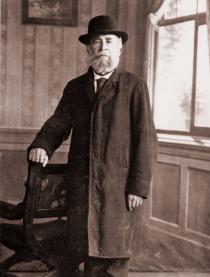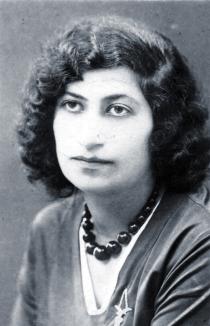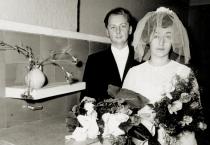Ruth Laane
This is me after we returned from the evacuation. This is what I looked like, when I went to the first grade at school. This photo was taken in Tallinn in 1946.
When we returned from evacuation, I only spoke Russian and did not know a word in Estonian. Our Estonian neighbors had two children, and gradually, playing with these children, I refreshed my Estonian. My mother and grandparents spoke fluent Estonian. However, my grandparents spoke Yiddish at home, and addressed me in Russian.
In 1946 I went to the first grade of a Russian school. Our classroom was huge. It was a former canteen. There were so many children in my class that they needed a lot of space. Many of them were overage because of the war. On the first day at school our teacher asked the children to tell her their year of birth and nationality. The Russian girl, my desk mate, asked me who I was and I said I was Jewish. Her face gained a scared expression and she whispered, 'Don't tell her!' She must have been in Tallinn during the war, and now she knew such things were to be kept a secret. She didn't mean to hurt me. Vice versa, she wanted to help. There were three Jewish children in my class. I never faced any anti-Semitism at school or observed any demonstrations of it towards other children.
I was a pioneer at school and believed everything we were told. I was a common Soviet child. I argued a lot with my grandfather and he was my opponent. My grandfather was trying to open my eyes, but I didn't let him. I remember always having a trump card. To all his attacks against the Soviet regime I replied that if it hadn't been for the Soviet regime, we would have stayed in Estonia during the war and we would not have survived. My grandfather surrendered under such argument and had nothing to object.
We celebrated Jewish holidays after World War II. My grandmother made matzah. I remember her making delicious egg matzah. My grandmother was a good cook. She was a very efficient cook, and we always had sufficient food. We managed all right even after the war, when the situation with food was tough. It is all to my grandmother's credit and her efficiency.
On Yom Kippur my grandfather and grandmother fasted. They did their best, considering the situation. The large synagogue in Tallinn burned down in 1944, but there was a prayer house that was called a synagogue. It was near my school. I remember when I was seven or eight years old, my grandmother and grandfather picked me up from school on Jewish holidays, and we went to the synagogue. Later, when I was a pioneer and then a Komsomol member, I stopped going to the synagogue.
The postwar period was hard and miserable, and we had no parties at home. We did not celebrate any religious holidays or birthdays. We celebrated my birthday at home, when I was in the 5th grade.





















